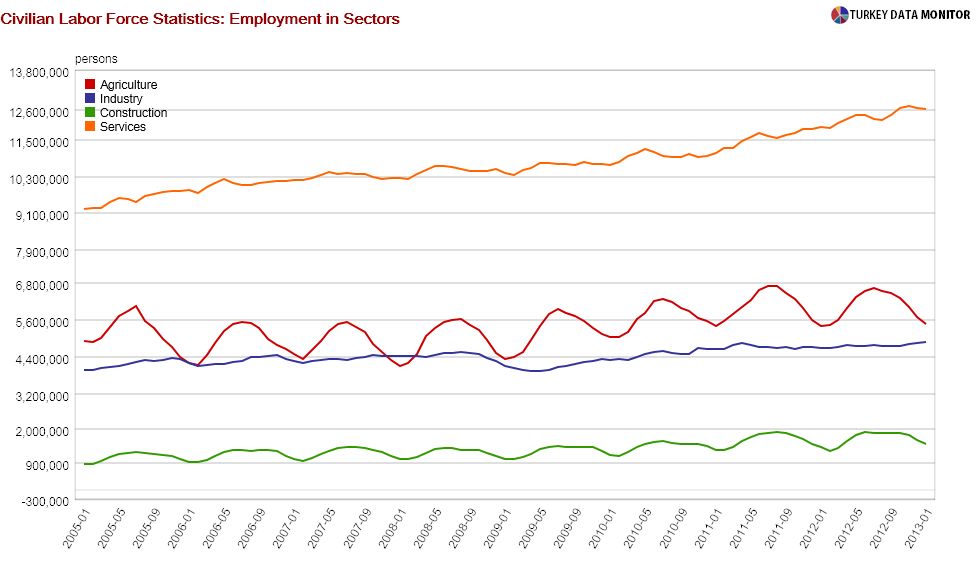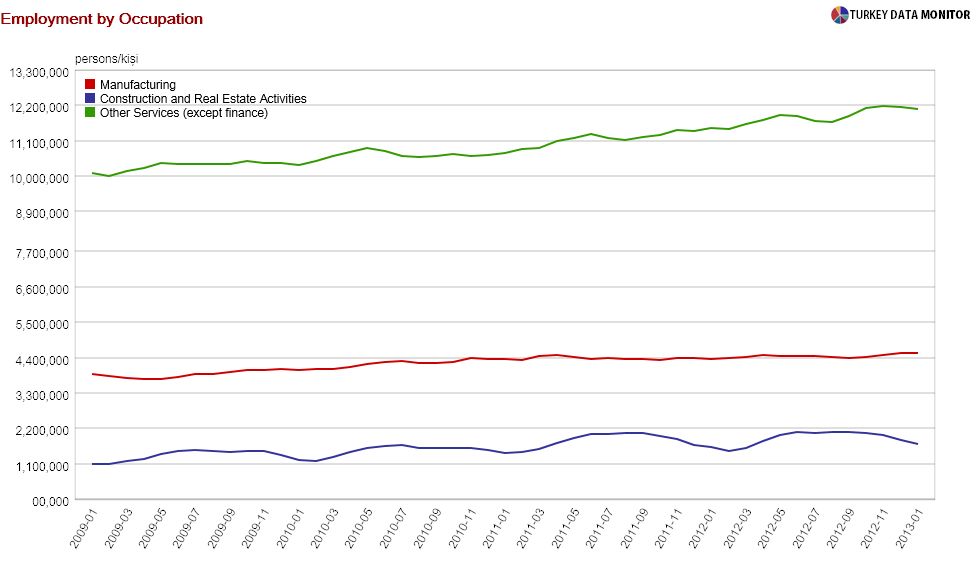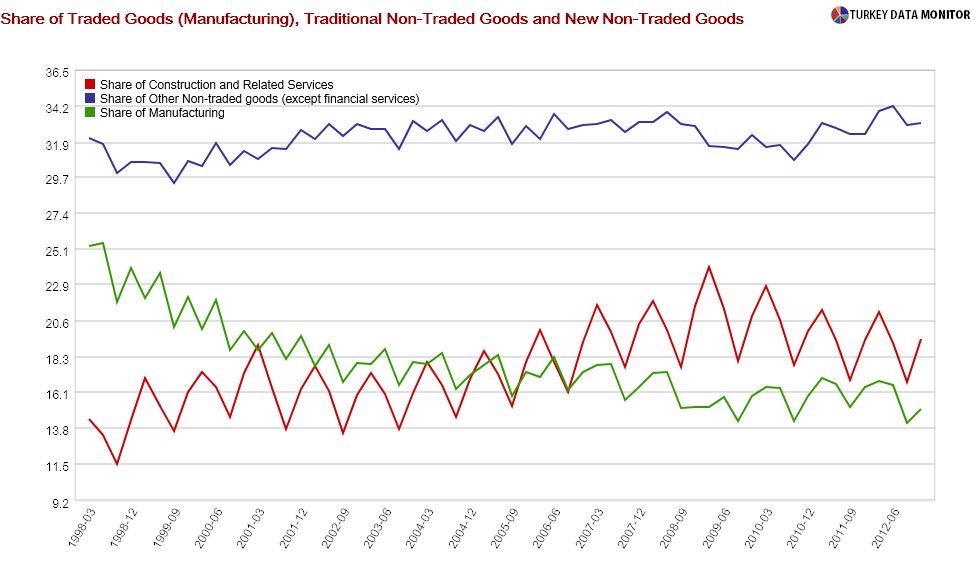Being a columnist is tough. You write a column that you are really proud of. Then, you find out that you messed up!:( I actually wouldn’t say I messed up my latest Hurriyet Daily News column, which I posted here as well. But thanks to a reader, I realized I did not actually show evidence that the construction sector is crowding out manufacturing:( Uppss…
This is partly because I sometimes assume that readers know what I know - which is not what a good econimic writer should do. Other times, I am trying to fit everything to my 3000-character (about 500 words) limit, and I tend to leave things out, on purpose or even inadvertently. This is of course not an excuse, but I luckily have this blog to sort things out.
Let’s start by looking at sectoral employment:
As you can see, employment in industry has been hovering just a little bit below 5m for some time, and while there has been some increase in construction, the real gains to employment have been in services. But these numbers are a bit general; for example, industry includes mining as well. Luckily, we have more detailed data from 2009:
Again the same picture. Note that construction is “wavy” because it is highly seasonal- just like agriculture. The rise in other services is more acute in both graphs, but remember that my framework predicts a shift in resources from manufacturing to all services, not just construction.
Finally, we can also look the shares in GDP of manufacturing, construction and other services:
Note that I left out finance in all these graphs because my framework does not tell much about finance, and it is a bit more complex to explain that sector- for example, financial deepening depends on many factors. Interestingly, the rise in the share of other services is smaller than that of construction. In other words, construction has been less employment-generating than other services, but I would need more detailed data to form a conviction on what is going on- and I don’t want to digress…
Note also that this phenomenon is not specific to Turkey. Ekomedya's blog compares Turkey with other countries and concludes that while Turkey’s and Mexico’s manufacturing shares are falling, Thailand’s is rising. In a very timely note (at least for me) published today, Capital Economics shows that while industrial output has boomed in Asia, it has stalled in most other parts of the emerging world during the last five years. Turkey managed a 10 percent increase, but that hasn’t prevented manufacturing to fall behind services.
I got a question on this issue while I was in Azerbaijan to present on the social impact of Turkish reforms. The questioner was noting that all countries advance from first being an agrarian to industrial country and then to a services-based economy. I tend to agree with that, but the problem is that Turkey jumped into services without getting rich first:( Maybe, that’s why we are trapped in a middle-income trap, but that’s the topic of a future column- maybe even Friday’s one…
So have I convinced you? A bit… After all, all I am showing is that manufacturing has lost ground to services. It may be because of the framework I described; it may be because of something else. But at least you now know what is actually going on: The rest of the story is anecdotal: For example, conglomerates like Eczacibasi and Zorlu have built huge shopping malls in the past few years rather than investing in their core businesses. I actually saw the real estate ads I mentioned in the last post in the former’s mall Kanyon:)…
Finally I’d like to respond to some of the comments posted over at HDN:
A reader challenged my notion that TOKI is in the business of providing low-income housing, noting that it is building villas in the Istanbul neighborhood of Zekeriyakoy on the old gendarme land. I like this anecdote because: 1. It explains how easy it is for TOKI to acquire cheap land. 2. It shows TOKI has been working like a normal construction company in the last few years. But the bulk of their portfolio is still lower/middle-income housing…
Another reader argued Turkey would not have a banking crisis because of real estate, like in the United States, and that construction companies are carrying the bubble risk rather than banks and consumers. At first glance, this statement seems to be right; Not only Turkey does not have mortgage-backed securities, mortgage is not very common, either. But as I showed in the column, home loans have surged. Besides, the mechanism in Turkey puts banks at risk as well. Here’s what I wrote on the issue last year:
In fact, it is the nature of this supply boom that worries me more than anything else: A construction company will borrow from a bank to start a new project. The same bank will then lend to consumers so that they can buy their dream home in the project. The bank ends up double-exposed this way. I was made aware of this scheme back in 2008 by a senior retail banker. The same banking professional recently told me that the major companies are starting new projects as soon as they sell a small share of existing ones- just enough to get the basic cash flow going. And interestingly, each project is bigger than the last. This strategy is bound to fall apart when sales grind to a halt.
So there there is reason to be worried for sure….
- English (UK)
- English (India)
- English (Canada)
- English (Australia)
- English (South Africa)
- English (Philippines)
- English (Nigeria)
- Deutsch
- Español (España)
- Español (México)
- Français
- Italiano
- Nederlands
- Português (Portugal)
- Polski
- Português (Brasil)
- Русский
- Türkçe
- العربية
- Ελληνικά
- Svenska
- Suomi
- עברית
- 日本語
- 한국어
- 简体中文
- 繁體中文
- Bahasa Indonesia
- Bahasa Melayu
- ไทย
- Tiếng Việt
- हिंदी
Actual Evidence On The Turkish Disease
Published 05/02/2013, 03:51 AM
Updated 07/09/2023, 06:31 AM
Actual Evidence On The Turkish Disease
3rd party Ad. Not an offer or recommendation by Investing.com. See disclosure here or
remove ads
.
Latest comments
Install Our App
Risk Disclosure: Trading in financial instruments and/or cryptocurrencies involves high risks including the risk of losing some, or all, of your investment amount, and may not be suitable for all investors. Prices of cryptocurrencies are extremely volatile and may be affected by external factors such as financial, regulatory or political events. Trading on margin increases the financial risks.
Before deciding to trade in financial instrument or cryptocurrencies you should be fully informed of the risks and costs associated with trading the financial markets, carefully consider your investment objectives, level of experience, and risk appetite, and seek professional advice where needed.
Fusion Media would like to remind you that the data contained in this website is not necessarily real-time nor accurate. The data and prices on the website are not necessarily provided by any market or exchange, but may be provided by market makers, and so prices may not be accurate and may differ from the actual price at any given market, meaning prices are indicative and not appropriate for trading purposes. Fusion Media and any provider of the data contained in this website will not accept liability for any loss or damage as a result of your trading, or your reliance on the information contained within this website.
It is prohibited to use, store, reproduce, display, modify, transmit or distribute the data contained in this website without the explicit prior written permission of Fusion Media and/or the data provider. All intellectual property rights are reserved by the providers and/or the exchange providing the data contained in this website.
Fusion Media may be compensated by the advertisers that appear on the website, based on your interaction with the advertisements or advertisers.
Before deciding to trade in financial instrument or cryptocurrencies you should be fully informed of the risks and costs associated with trading the financial markets, carefully consider your investment objectives, level of experience, and risk appetite, and seek professional advice where needed.
Fusion Media would like to remind you that the data contained in this website is not necessarily real-time nor accurate. The data and prices on the website are not necessarily provided by any market or exchange, but may be provided by market makers, and so prices may not be accurate and may differ from the actual price at any given market, meaning prices are indicative and not appropriate for trading purposes. Fusion Media and any provider of the data contained in this website will not accept liability for any loss or damage as a result of your trading, or your reliance on the information contained within this website.
It is prohibited to use, store, reproduce, display, modify, transmit or distribute the data contained in this website without the explicit prior written permission of Fusion Media and/or the data provider. All intellectual property rights are reserved by the providers and/or the exchange providing the data contained in this website.
Fusion Media may be compensated by the advertisers that appear on the website, based on your interaction with the advertisements or advertisers.
© 2007-2024 - Fusion Media Limited. All Rights Reserved.
